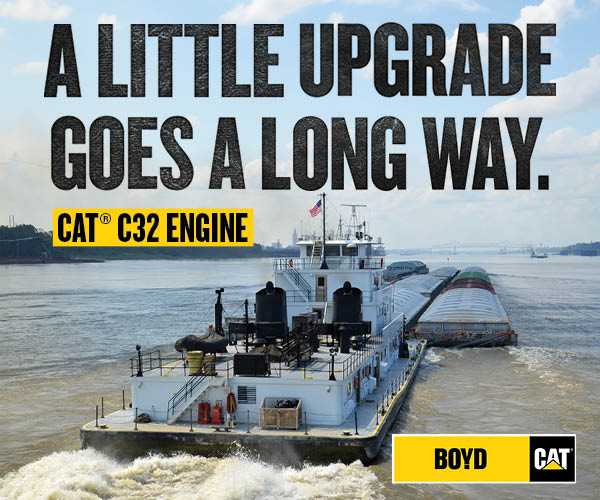Washington, D.C.—Calling it “one of the most significant laws in our history,” President Joe Biden signed a massive climate, health and tax bill that includes provisions tracked by the maritime industry.
The American Waterways Operators (AWO) cited the Inflation Reduction Act’s provisions supportive of offshore wind development and tax credits for offshore wind vessels.
“It also overturns the moratorium on offshore wind development along the southern Atlantic coast, expands offshore wind for U.S. overseas territories,” AWO stated.
After the House gave H.R. 5376 final congressional approval by a party-line vote of 220 to 207, the American Association of Port Authorities (AAPA) applauded a new grant program to fund electrification projects at ports.
With $3 billion over five years, AAPA said the program will fund innovative projects to boost resiliency and “plug in” more cargo and passenger operations.
“From cranes to cold chain to cruise tourism, the government’s investment in port modernization will begin to unlock tens of billions of dollars for projects in the pipeline,” AAPA stated.
AAPA President and CEO Chris Connor said ports across the nation are ready to upgrade, expressing gratitude to the work of port representatives and legislators for the bill.
Biden used his remarks leading up to bill signing to list a number of its goals, ranging from lowering prescription drug prices and ensuring big corporations pay their “fair share” in taxes to investing $369 billion to confront the “climate crisis” and strengthen the nation’s energy security.
Moments after signing the measure, Biden handed the pen he used to Sen. Joe Manchin (D-W.Va.), whose support was crucial to the success of the bill, a scaled-down version of Biden’s failed Build Back Better proposal.
Manchin later spoke of the commitment he received from Biden and top congressional Democrats to move what he called a “comprehensive permitting reform package.”
A list of those provisions posted on Manchin’s Senate website included timelines for permitting reviews and changes to the Clean Water Act’s Section 401, incorporating those from both the Trump and Biden administrations.
TSMS Audit Scheme
The Coast Guard Office of Commercial Vessel Compliance (CG-CVC) announced the release of CVC Policy Letter 18-01, CH.2, Guidance on the Audit Scheme for Vessels Using a Towing Safety Management System (TSMS) Option.
The revised policy letter can be found at dco.uscg.mil.
Changes include guidance on the initial Certificate of Inspection (COI) under the TSMS option and external vessel audits.
For additional information, contact CVC-4 staff at FlagStateControl@uscg.mil.
RAISE Grants
Projects to modernize ports were among the 166 funded with more than $2.2 billion announced by the Biden administration from the Rebuilding American Infrastructure with Sustainability and Equity (RAISE) program.
“This year we are supporting more projects than ever before,” said Transportation Secretary Pete Buttigieg, whose agency said the funding more than doubles the amount for the popular RAISE program.
Roads, bridges, transit, rail and intermodal transportation projects also were included in the announcement.
Those involving ports included a new berth at Port Redwing, Tampa, Fla., $12.6 million; new seawall and upgraded port facility, Marine Service Center, Sitka, Alaska, $7.8 million; increase terminal capacity, Qawalangin Tribe of Unalaska, Alaska, $22.3 million; construct rail-roadway grade separation, Port of Los Angeles-Long Beach, Calif., $20 million; expanded rail capacity and cargo gate optimization, Port Miami, Fla., $16 million; and new intermodal facility, Port of Wilmington, N.C., $18 million.
NCTSAC Vacancies
The Coast Guard is accepting applications to fill eight vacancies on the National Chemical Transportation Safety Advisory Committee to advise the secretary of Homeland Security on matters relating to the safe and secure marine transportation of hazardous materials.
Applications must reach the Coast Guard by September 12 via email to Ethan.T.Beard@uscg.mil with subject line ‘‘Application for NCTSAC.’’
In this solicitation, applicants will be considered for positions representing the following entities: chemical manufacturing, marine handling or transportation of chemicals, vessel design and construction, marine safety or security entities and marine environmental protection.
For additional information, contact Lt. Ethan Beard at 202-372-1419 or Ethan.T.Beard@uscg.mil.
Supply Chain Congestion
The Federal Maritime Commission (FMC) is seeking comments on whether supply chain congestion warrants the issuance of an emergency order requiring common carriers and marine terminal operators (MTOs) to share key information with shippers, truckers and railroads.
Comments should be submitted by September 14 to secretary@fmc.gov with “Docket No. 22-19, Request for Information” in the subject line.
The Ocean Shipping Reform Act (OSRA) of 2022 authorizes the FMC to issue such an emergency order after seeking comments on three questions:
• Has congestion created an emergency situation of a magnitude such that there exists a substantial, adverse effect on the competitiveness and reliability of the international ocean transportation supply system?
• Would an emergency order issued by the commission alleviate the emergency situation?
• What would be the appropriate scope of the emergency order?
If the FMC issues an emergency order, common carriers and MTOs would be required to share directly with relevant shippers, rail carriers or motor carriers information relating to cargo throughput and availability.
For additional information, contact William Cody at 202-523-5908 or secretary@fmc.gov.
OSRA Freight Logistics
Transportation Secretary Pete Buttigieg and Port Envoy retired Gen. Stephen Lyons hosted partners of Freight Logistics Optimization Works (FLOW), a supply chain data exchange initiative launched in March to speed up delivery times and cut costs.
“The Biden-Harris administration is proud to bring together companies from across the supply chain in this first-of-its-kind initiative to share information and help move goods more quickly and cheaply,” Buttigieg said.
“To keep supply chains moving and prices down, we must invest not only in our physical infrastructure but also our digital infrastructure, and FLOW is an important part of that effort.”
According to the Department of Transportation (DOT), the number of participants has doubled to 36 and range from ports and shippers to retail firms.
DOT said it also plans to hold listening sessions with others such as small businesses and technology experts.




